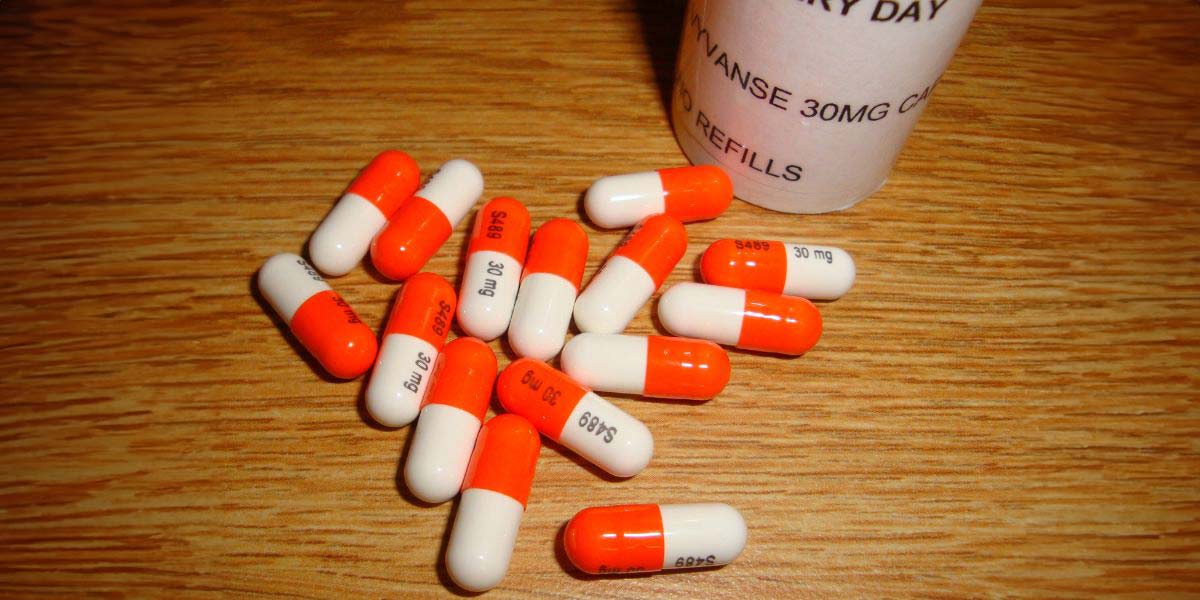Is Vyvanse (Lisdexamfetamine Dimesylate) Addictive?

Vyvanse, known generically as lisdexamfetamine dimesylate, is a prescription medication primarily used to treat attention deficit hyperactivity disorder (ADHD) and binge eating disorder. As a prescription stimulant, it helps increase attention and decrease impulsiveness in people diagnosed with ADHD. However, because of its stimulant properties, Vyvanse has a high potential for abuse and addiction.
What Is Vyvanse?
Lisedexamfetamine dimesylate (Vyvanse) is a prescription drug classified as a Schedule II controlled substance, indicating its high potential for abuse and addiction. It is primarily prescribed for managing ADHD and binge eating disorder— Vyvanse works by affecting chemicals in the brain and nerves that contribute to hyperactivity and impulse control.
Despite being designed as a prodrug to reduce misuse, if you abuse Vyvanse, it can lead to addiction. The drug becomes dextroamphetamine, a strong stimulant, when misused, leading to powerful effects and a higher chance of addiction.
Side Effects of Vyvanse
Vyvanse has several side effects that users should be aware of, ranging from mild to severe. Monitoring these side effects is essential, especially when taking the drug long-term.
Common side effects of Vyvanse include:
- Increased Blood Pressure: Can elevate the risk of heart health problems like heart attacks or strokes
- Mental Health Effects: May exacerbate anxiety, depression, or irritability
- Weight Loss: Because of appetite suppression, leading to potential nutritional deficiencies.
- Insomnia: Difficulty in falling or staying asleep, resulting in fatigue and irritability
- Digestive Issues: Symptoms like nausea, vomiting, or abdominal pain

Vyvanse Addiction Potential
Vyvanse’s classification as a Schedule II controlled substance highlights its high potential for abuse and addiction. The drug’s stimulant effects can lead to both physical and psychological dependence, including:
- Euphoria: The drug can create feelings of euphoria, increasing its misuse potential
- Tolerance: Over time, users may need higher doses to achieve the same effects, leading to dependence
- Altered Administration: Misusing Vyvanse by crushing or dissolving it to achieve a quicker high significantly increases addiction risk
Psychological Dependence
One of the most significant aspects of Vyvanse addiction is psychological dependence. Some people misuse Vyvanse. They may rely on it to feel normal. They might also need it to do everyday activities like studying, working, or socializing.
Overcoming this psychological dependence is challenging because the person may feel they can’t live without the drug. Relying heavily on Vyvanse for a long time can create a feeling of dependency. This may lead to feeling like the medication is necessary even when it is not. It can also cause problems in a person’s life.
Behavioral Changes Linked to Addiction
As addiction to Vyvanse develops, people may exhibit noticeable behavioral changes. People may hide their drug use, lie to doctors for more prescriptions, or take dangerous actions to get the drug.
People who are addicted to Vyvanse may neglect their responsibilities at work, school, or home. This is because they prioritize obtaining and using the drug.
They may prioritize getting and using the drug over fulfilling their obligations. This can lead to negative consequences in various aspects of their lives. These behavioral changes can lead to significant disruptions in the person’s life, damaging relationships and jeopardizing their future.
Physical Dependence and Withdrawal
When someone takes Vyvanse regularly, their body gets used to it. If they suddenly stop taking it, they may experience withdrawal symptoms. Withdrawal symptoms from Vyvanse can include fatigue, depression, increased appetite, and sleep disturbances.
These symptoms can be quite severe, making it difficult for people to stop using Vyvanse without professional help. People often keep using a drug because they fear withdrawal symptoms, even if they know they are dependent on it.
Risk of Overdose
Misuse of Vyvanse increases the risk of overdose, especially when combined with other substances like alcohol or other stimulants. Symptoms of overdose include:
- Rapid heart rate
- Confusion or hallucinations
- Panic or severe anxiety
- Potentially life-threatening conditions like heart attack or stroke
Overdosing on Vyvanse is a medical emergency that requires immediate attention. The stimulant effects can cause severe cardiovascular and neurological complications, which can be fatal if not treated promptly. Those who misuse Vyvanse or take higher doses than prescribed are at an increased risk of overdose, highlighting the importance of adhering to prescribed dosages and seeking help if misuse begins.
Signs and Symptoms of Vyvanse Abuse
Recognizing the signs of Vyvanse abuse is crucial for early intervention and treatment. Symptoms can manifest physically, behaviorally, and psychologically.
Physical Signs:
- Unexplained weight loss
- Frequent headaches
- Insomnia or irregular sleep patterns
- Elevated blood pressure and heart rate
Behavioral Symptoms:
- Taking higher doses than prescribed
- “Doctor shopping” to obtain multiple prescriptions
- Secretive behavior about drug use
- Neglecting responsibilities at work, school, or home

Vyvanse Addiction Treatment at Northridge Addiction Treatment Center
Northridge Addiction Treatment Center (NATC) provides comprehensive addiction treatment programs in a comfortable, nurturing, family-like residential treatment center. Our approach combines medical care with evidence-based behavioral therapies to address both the physical and psychological aspects of addiction.
At NATC, we understand that addiction is a complex condition that affects all aspects of a person’s life. Therefore, we provide a patient-focused, compassionate approach to substance use disorder treatment that includes evidence-based treatments and therapy programs, mindfulness practices, nutrition counseling, and support groups to support overall well-being during recovery.
If you or a loved one is struggling with any type of prescription drug abuse, NATC is here to help.
Contact NATC today. We have a dedicated team of treatment specialists committed to helping you find the proper care for your immediate needs to get you on a path to lasting recovery.
Find Meaningful Recovery
Our caring and compassionate specialists are eager to help you comfortably navigate this journey to recovery. Our individualized treatment plan, programs, and therapies may be a perfect match for you or your loved one. Let us assist you in living the happy life you deserve. It starts with a phone call.




